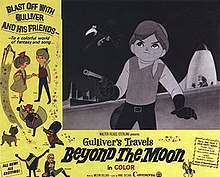Gulliver's Travels Beyond the Moon
Gulliver's Travels Beyond the Moon
Jump to navigation
Jump to search
This article may be in need of reorganization to comply with Wikipedia's layout guidelines. (September 2016) (Learn how and when to remove this template message) |
This article needs additional citations for verification. (September 2016) (Learn how and when to remove this template message) |
| Gulliver's Travels Beyond the Moon | |
|---|---|
 Theatrical poster to the 1966 US release of Gulliver's Travels Beyond the Moon | |
| Directed by | Masao Kuroda Sanae Yamamoto |
| Produced by | Hiroshi Ogawa Akira Onozaki |
| Written by | Shinichi Sekizawa Jonathan Swift (novel Gulliver's Travels) Hayao Miyazaki (additional screenplay material; uncredited) |
| Starring | voices: Herb Duncan (US) Robert Harter (US) Darla Hood (US) Chiyoko Honma (Japan) Masao Imanishi (Japan) Seiji Miyaguchi (Japan) Akira Oizumi (Japan) Shoichi Ozawa (Japan) Kyū Sakamoto |
| Music by | Isao Tomita (Japanese version) Anne DeLugg (US version) Milton DeLugg (US version) |
| Distributed by | Toei Co. Ltd. (Japan) Continental Distributing Inc. (1966 US) |
Release date |
|
Running time | 80 min. 85 min. (US) |
| Country | Japan |
| Language | Japanese |
Gulliver's Travels Beyond the Moon (ガリバーの宇宙旅行, Garibā no Uchū Ryokō, Gulliver's Space Travels), also known as Space Gulliver, is a 1965 Japanese animated feature that was released in Japan on March 20, 1965 and in the United States on July 23, 1966.
Contents
1 Production
2 Staff
3 Plot
4 Reception
5 References
6 Further reading
7 External links
Production[edit]
This was one of the first Toei animated features to depart from Asian mythology, though, like Toei's previous animated features, it is modeled after the Disney formula of animated musical feature. By borrowing elements from Hans Christian Andersen, Jonathan Swift and science fiction, it was hoped that this film would attract a large international audience. However it proved to be no more popular than Toei's previous, Asian-themed films. After the failure in the U.S. of this and Toei's previous animated feature[clarification needed], this was the last Japanese animated feature to be released in the United States for over a decade, until Sanrio's Metamorphoses and The Mouse and His Child, both of which were released in the U.S. in 1978.[1]
Staff[edit]
Not yet the internationally popular electronic music composer he was later to become, Isao Tomita contributed the original Japanese score. However, for the American edition, songs were composed by Milton and Anne Delugg, who had provided the song "Hooray for Santy Claus" for Santa Claus Conquers the Martians (1964).
In one of his earliest animation jobs, a young Hayao Miyazaki worked on this film as an in-between artist. His contribution to the ending of the film brought Miyazaki to the attention of Toei. The screenplay was written by Shinichi Sekizawa, the writer of the first Mothra (1961). Sekizawa also contributed screenplays to some of the most popular films in the Godzilla series from King Kong vs. Godzilla (1962), to Godzilla vs. Mechagodzilla (1974), including Mothra vs. Godzilla (1964).
Plot[edit]
The story concerns a homeless boy named Ricky, or Ted in the Japanese version. After seeing a movie about Gulliver he meets Professor Gulliver himself in a forest. Gulliver is now an elderly, space-traveling scientist. With Dr. Gulliver's assistant Sylvester the crow (named Crow in the Japanese edition), and Ricky's companions, a talking dog and a toy soldier, they travel the Milky Way to the Planet of Blue Hope, which has been taken over by the Queen of Purple Planet and her evil group of robots. Armed with water-pistols and water balloons, which melt the villains, Ricky and Gulliver restore Blue Hope to its doll-like owners. Then the boy wakes up.
Reception[edit]
In a contemporary review, the Monthly Film Bulletin reviewed an 85-minute English-language dubbed version of the film, and described it as a "charmless animated feature".[2] The review described the animation as "mediocre" and with "little variation or invention and a noticeable lack of perspective"[2]
References[edit]
^ Beck, Jerry (2005). The animated movie guide. Chicago: Chicago Review Press. p. 101. ISBN 1-55652-591-5..mw-parser-output cite.citationfont-style:inherit.mw-parser-output qquotes:"""""""'""'".mw-parser-output code.cs1-codecolor:inherit;background:inherit;border:inherit;padding:inherit.mw-parser-output .cs1-lock-free abackground:url("//upload.wikimedia.org/wikipedia/commons/thumb/6/65/Lock-green.svg/9px-Lock-green.svg.png")no-repeat;background-position:right .1em center.mw-parser-output .cs1-lock-limited a,.mw-parser-output .cs1-lock-registration abackground:url("//upload.wikimedia.org/wikipedia/commons/thumb/d/d6/Lock-gray-alt-2.svg/9px-Lock-gray-alt-2.svg.png")no-repeat;background-position:right .1em center.mw-parser-output .cs1-lock-subscription abackground:url("//upload.wikimedia.org/wikipedia/commons/thumb/a/aa/Lock-red-alt-2.svg/9px-Lock-red-alt-2.svg.png")no-repeat;background-position:right .1em center.mw-parser-output .cs1-subscription,.mw-parser-output .cs1-registrationcolor:#555.mw-parser-output .cs1-subscription span,.mw-parser-output .cs1-registration spanborder-bottom:1px dotted;cursor:help.mw-parser-output .cs1-hidden-errordisplay:none;font-size:100%.mw-parser-output .cs1-visible-errorfont-size:100%.mw-parser-output .cs1-subscription,.mw-parser-output .cs1-registration,.mw-parser-output .cs1-formatfont-size:95%.mw-parser-output .cs1-kern-left,.mw-parser-output .cs1-kern-wl-leftpadding-left:0.2em.mw-parser-output .cs1-kern-right,.mw-parser-output .cs1-kern-wl-rightpadding-right:0.2em
^ ab "Garibah no Uchu Ryoko (Gulliver's Travels Beyond the Moon)". Monthly Film Bulletin. Vol. 37 no. 432. British Film Institute. 1970. p. 128.
Further reading[edit]
Beck, Jerry (2005). The animated movie guide. Chicago: Chicago Review Press. ISBN 1-55652-591-5.
Clements, Jonathan and Helen McCarthy (2001). The anime encyclopedia: a guide to Japanese animation since 1917. Berkeley, Calif: Stone Bridge Press. ISBN 1-880656-64-7.
External links[edit]
Gariba no uchu ryoko on IMDb
Gulliver's Travels Beyond the Moon at AllMovie
Gulliver no Uchū Ryokō (anime) at Anime News Network's encyclopedia
Categories:
- 1965 films
- Japanese-language films
- 1965 anime films
- 1960s adventure films
- 1960s fantasy films
- Adventure anime and manga
- Animated adventure films
- Fantasy adventure films
- Fantasy anime and manga
- Gulliver's Travels
- Japanese adventure films
- Japanese films
- Japanese animated fantasy films
- Toei Animation films
- Toei Company films
- Films about extraterrestrial life
(window.RLQ=window.RLQ||).push(function()mw.config.set("wgPageParseReport":"limitreport":"cputime":"0.324","walltime":"0.421","ppvisitednodes":"value":1501,"limit":1000000,"ppgeneratednodes":"value":0,"limit":1500000,"postexpandincludesize":"value":50440,"limit":2097152,"templateargumentsize":"value":3409,"limit":2097152,"expansiondepth":"value":21,"limit":40,"expensivefunctioncount":"value":5,"limit":500,"unstrip-depth":"value":1,"limit":20,"unstrip-size":"value":8271,"limit":5000000,"entityaccesscount":"value":1,"limit":400,"timingprofile":["100.00% 345.061 1 -total"," 26.19% 90.359 1 Template:Reflist"," 23.87% 82.381 3 Template:Cite_book"," 19.78% 68.263 1 Template:Infobox_film"," 17.20% 59.364 1 Template:Infobox"," 16.68% 57.558 1 Template:Cleanup_reorganize"," 11.67% 40.273 2 Template:Ambox"," 10.47% 36.120 1 Template:IMDb_title"," 8.16% 28.154 1 Template:What?"," 6.77% 23.376 1 Template:Fix-span"],"scribunto":"limitreport-timeusage":"value":"0.139","limit":"10.000","limitreport-memusage":"value":3777707,"limit":52428800,"cachereport":"origin":"mw1268","timestamp":"20181014015536","ttl":3600,"transientcontent":true);mw.config.set("wgBackendResponseTime":528,"wgHostname":"mw1268"););

 Clash Royale CLAN TAG
Clash Royale CLAN TAG